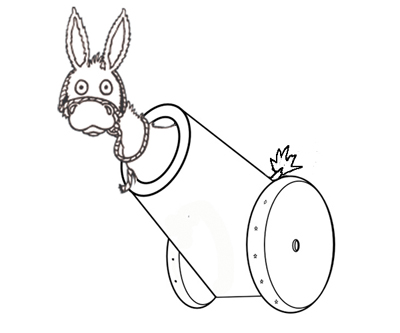 I’m a people-pleaser. I hate to disappoint anyone. When folks have conflicting expectations, I’ll twist myself into a pretzel to avoid taking sides. Sometimes I try to prevent conflicts by guessing, in advance, what people are going to want. This doesn’t work very well. It can even lead me to abandon a perfectly good plan because of imagined criticism that hasn’t happened yet.
I’m a people-pleaser. I hate to disappoint anyone. When folks have conflicting expectations, I’ll twist myself into a pretzel to avoid taking sides. Sometimes I try to prevent conflicts by guessing, in advance, what people are going to want. This doesn’t work very well. It can even lead me to abandon a perfectly good plan because of imagined criticism that hasn’t happened yet.
When I was telling my husband about my latest fiasco, he began imitating the sounds of rocket-propelled warfare: a high-pitched whine followed by an explosive splash.
“What’s that?” I asked.
“A donkey launcher,” he replied.
“I beg your pardon?”
“Remember the Aesop’s Fable about the donkey?”
The fable was a dim memory, so I went and looked it up.
It seems a man and his son were leading their donkey to market. A fellow traveler called out, “You fools! Why are you walking? Donkeys are for riding!”
So the man put the boy on the donkey’s back and they continued on their way until someone said, “Look at that lazy boy, making his father walk.”
Father and son traded places. The next person criticized the father for making his young son walk.
After that, they both rode the donkey together until someone said, “Shame on you for overloading that poor animal! The two of you should carry him!”
Wanting to prove his good intentions, the father tied the donkey’s feet to a pole. Father and son hoisted the pole onto their shoulders. The animal thrashed and kicked. As they were crossing a bridge, it struggled out of their grasp and fell into the water, where it drowned with its feet tied together.
The moral of the story is: “Please all, and you will please none.”
“Okay, I get the point,” I said, “but where does the launcher come into it?”
“Why not be efficient?” he asked. “Why wait for people to criticize you? Just line up the donkeys and start launching them from the bridge the moment anyone heads your way.” He began making those launching and splashing sounds again.
I silenced him with a threatening glare, but the conversation continued inside my head. “What’s wrong with caring about what other people want?” I grumbled defensively. “What’s wrong with respecting their opinions? Isn’t that what kindness and humility are all about?”
An absurd image of airborne donkeys derailed my rant. I couldn’t help chuckling.
“All right,” I admitted to myself. “I can’t be changing my tune every time I meet someone who disapproves. It’s up to me to make a wise choice and stick with it.”
Pondering the donkey story, I noticed something interesting: The people who offered criticism were all strangers! The father was not accountable to them, nor did their wellbeing depend upon his decisions. Their opinions were irrelevant to his mission. Yet he went to ridiculous lengths to please them.
I must admit that I’ve sometimes fallen into the same temptation, ignoring my responsibilities while seeking the approval of strangers. It’s much easier to momentarily please a stranger than to consistently earn the respect of a family member or coworker who sees me every day and depends on me to get things done.
As assertive servants, we should not measure our success by the approval of others. We should choose worthy goals and work steadily to accomplish them. We’ll sometimes disappoint people whose vision differs from ours. We may step on their toes because we aren’t attuned to every emotion around us. Such disappointments are inevitable if we are to stay focused on our mission. The people close to us will not always be happy with us, but over time we will gain their trust and respect.